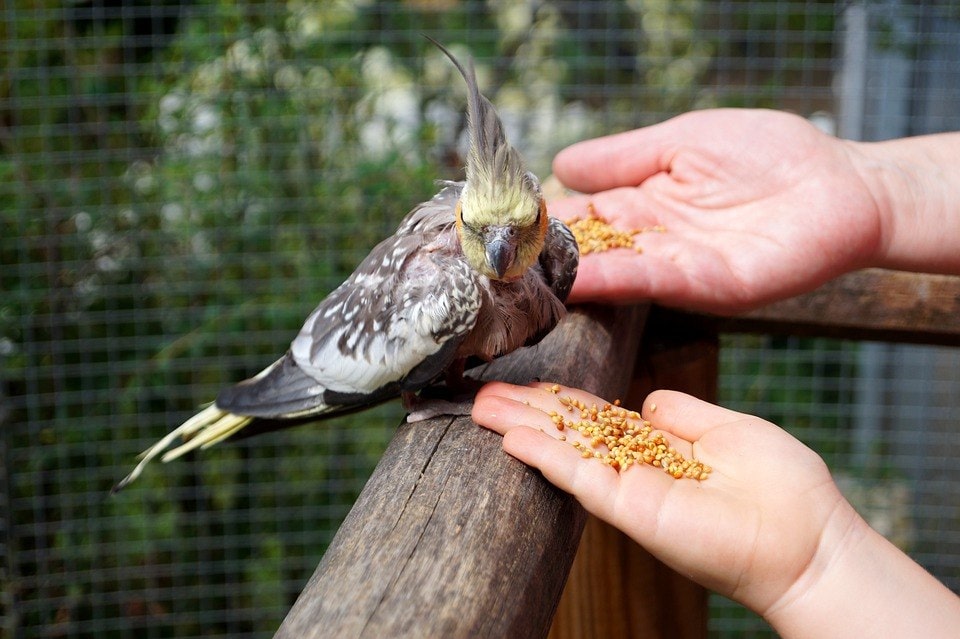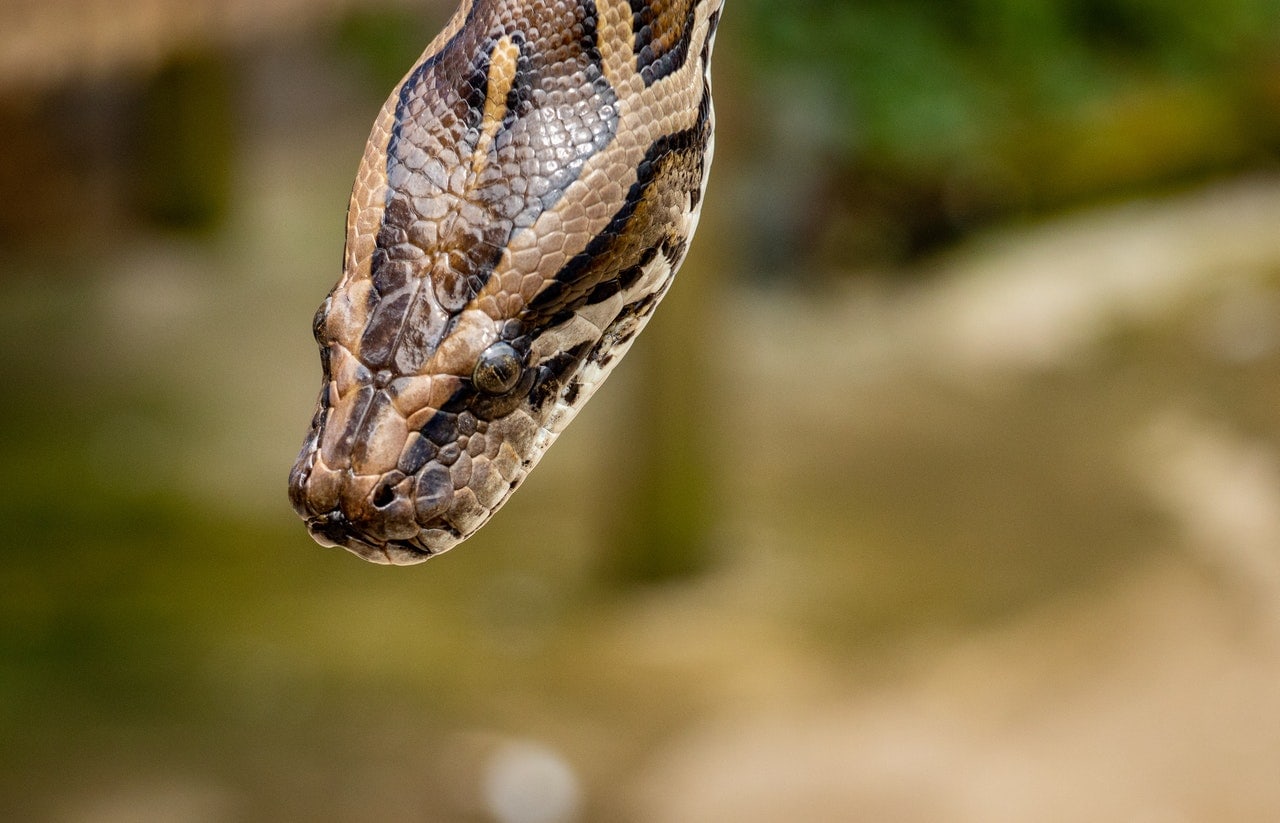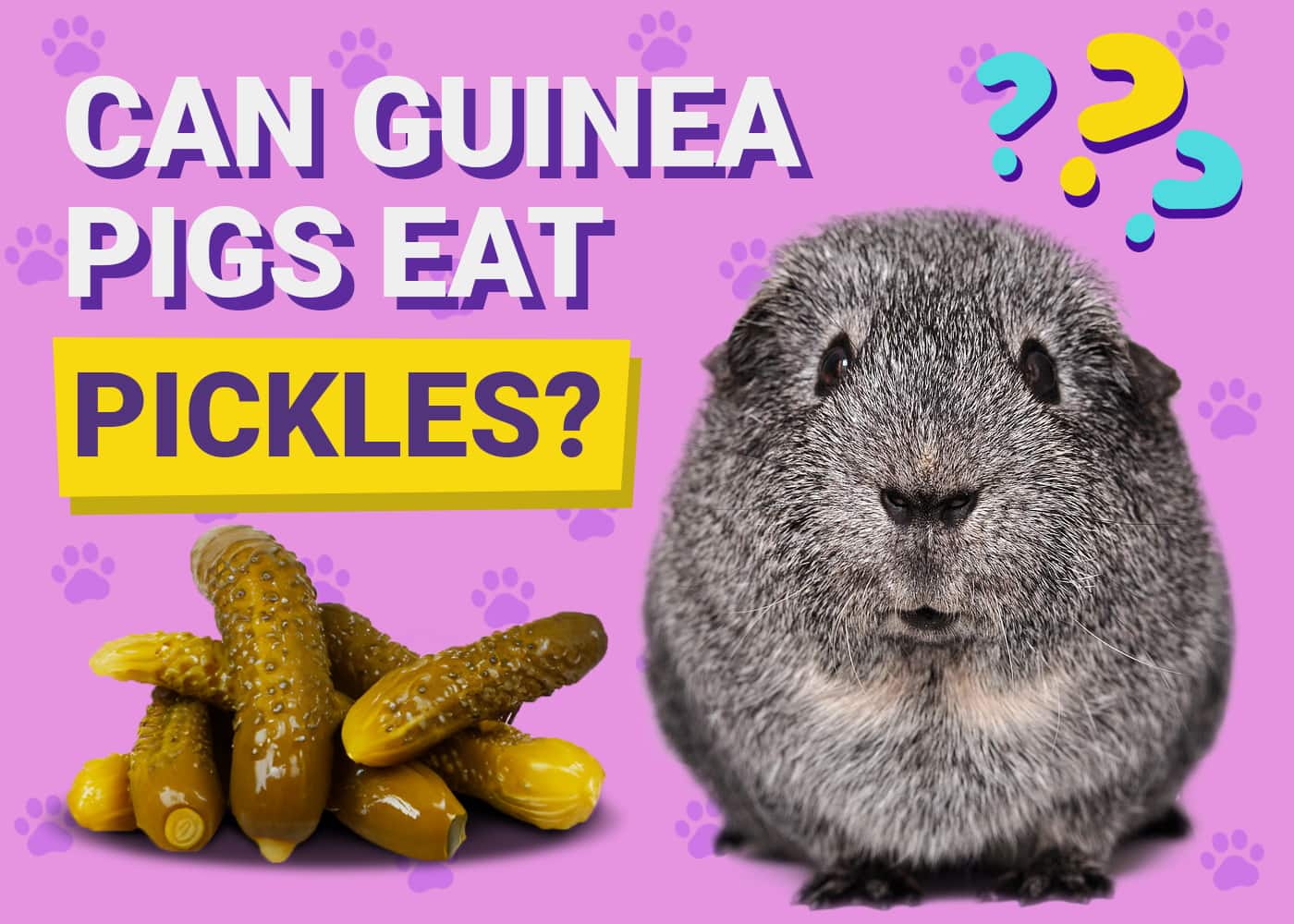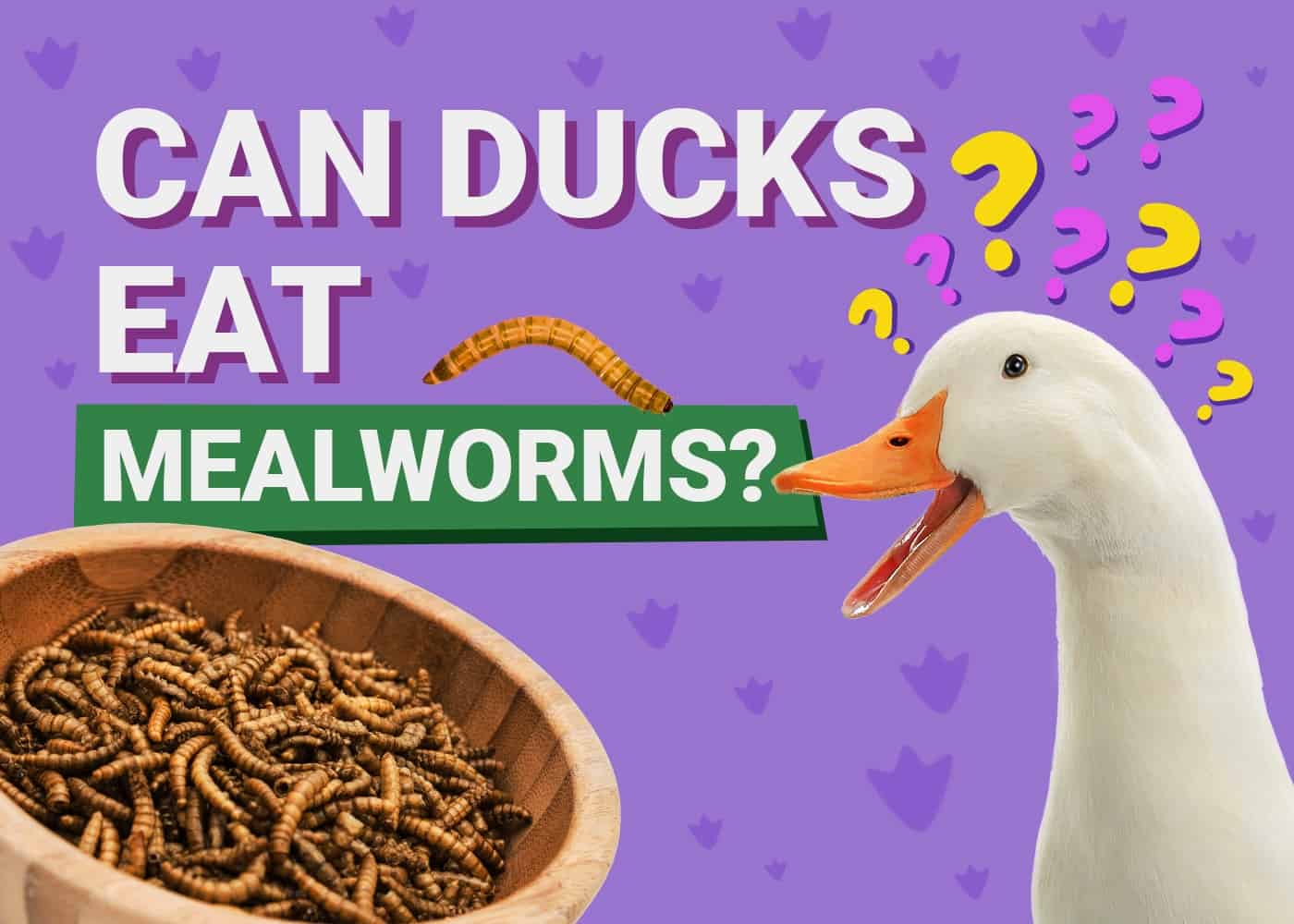Click to Skip Ahead
The common saying, “You are what you eat,” is as true for a cockatiel as it is for any other living thing. While these popular pet birds can live as long as 15 years, they need the right care to stay healthy and reach that lifespan. Feeding the proper diet is an integral part of ensuring your cockatiel survives and thrives!
Wild cockatiels eat a variety of seeds, nuts, grasses, and fruits. To stay healthy, pet cockatiels need a varied diet as well. In this article, we’ll discuss the food cockatiels can eat, as well as some foods to avoid. We’ll also show why a healthy diet is vital for cockatiels and how to coax your bird into eating healthier even if they aren’t used to it.

Why It Matters What Cockatiels Eat
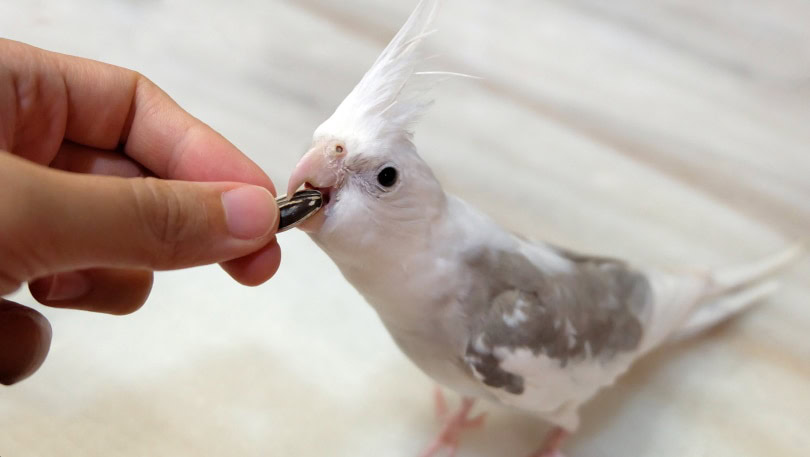
Cockatiels, like their larger relatives, the cockatoos, are prone to gaining too much weight. Just like in humans, obesity is unhealthy for cockatiels. Overweight cockatiels can develop breathing problems, diabetes, or liver issues. Feeding a balanced diet is critical to keeping your cockatiel at a healthy weight.
Without a nutritious diet, cockatiels may not get enough essential vitamins and minerals and develop conditions such as iodine deficiency. They may also have other problems, such as egg binding and feather picking.
Cockatiel Food: The Basics
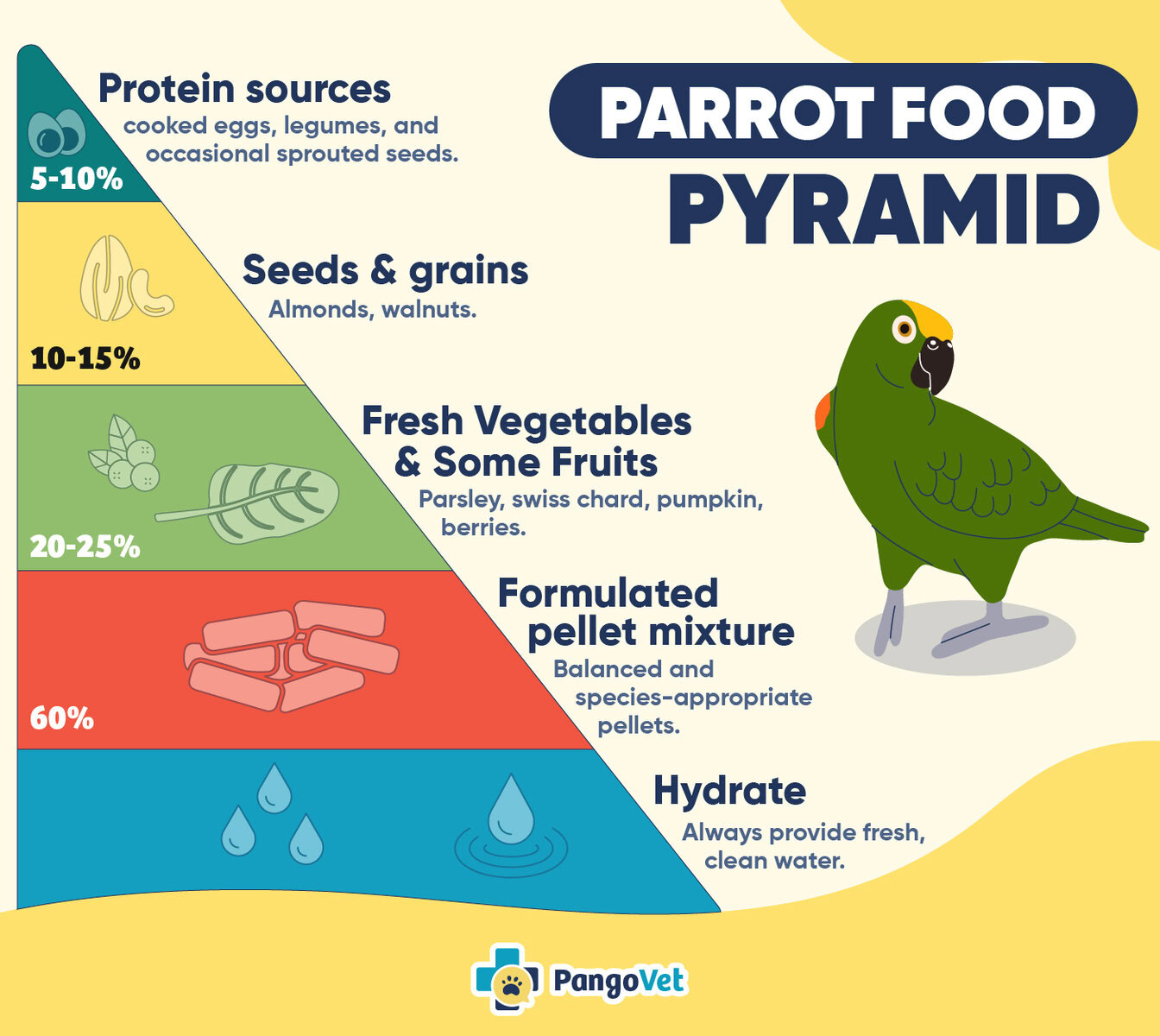
Most of a pet cockatiel’s diet should be a mixture of formulated pellet food and seeds, about 75% pellets to 25% seeds. All cockatiels love seeds, but pet cockatiels can’t live on seeds alone, even if they want to. Seed mixes are high in fat and lack all the nutrients the cockatiel needs to stay healthy.
In addition to their pellets and seeds, cockatiels should be fed a variety of fruits, vegetables, and healthy proteins. Every cockatiel has different tastes, and you might need to try several foods to determine what your cockatiel likes. Fortunately, cockatiels can also eat the most nutritious, unprocessed human foods.
Fruits
Cockatiels should be offered fresh fruit every day. Until you learn your cockatiel’s tastes, offer small amounts of different fruits. Be patient, as your cockatiel may reject a certain fruit on one day only to decide they can’t get enough of it the next. Most fruits, but not fruit seeds, are safe for cockatiels to eat. Some fruits to try include the following:
- Bananas
- Apples
- Mango
- Kiwi
- Berries
Always wash fruit before feeding it to your cockatiel to ensure it does not contain pesticides or other chemicals. It should be cut up small and served in a separate dish from the pellet/seed food.
Cockatiels can also eat dried fruits, such as raisins or apricots, if fresh fruit is unavailable.
Vegetables
In addition to fruit, cockatiels should be served a variety of vegetables every day. Dark, leafy greens are a particularly healthy option for your cockatiel. Here are some vegetables you can try:
- Bok choy
- Romaine lettuce
- Sweet potato (cooked)
- Carrots
- Peas
- Corn
- Zucchini
Cockatiels can eat fresh, cooked, or thawed frozen vegetables. Make sure to wash all fresh vegetables and cut them into small pieces before feeding them. If you cook vegetables for your cockatiel, avoid adding salt or spices.
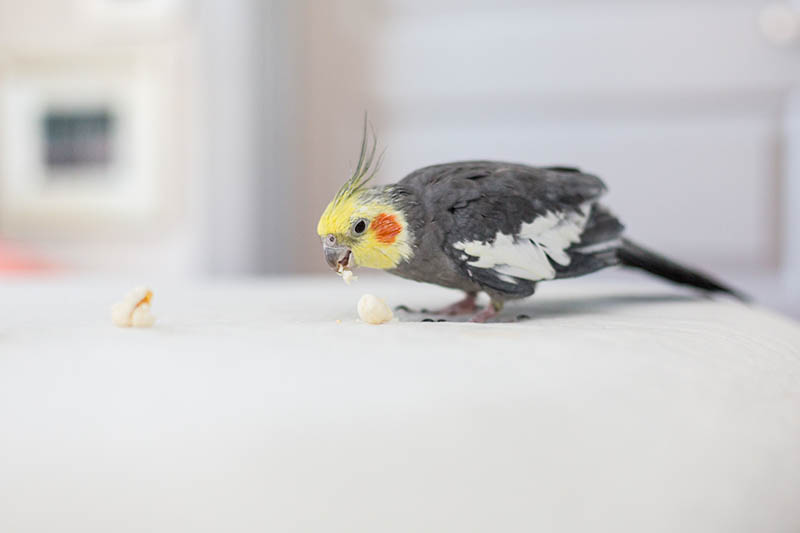
Grains
Cockatiels can safely eat several grains, but they should only be fed in moderation. Here are some grains and grain-containing foods that a cockatiel can eat:
- Brown rice
- Quinoa
- Cooked oats
- Whole grain pasta
Proteins
Several low-fat protein sources can be offered to cockatiels, which are beneficial when they are molting. Here are some proteins that cockatiels can eat:
- Cooked chicken or turkey
- Eggs
- Fish
- Cooked dried beans
- Cottage cheese
Proteins like meat, fish, or eggs should only be fed when freshly cooked, and any uneaten amount should be cleaned up quickly to prevent the growth of dangerous bacteria.
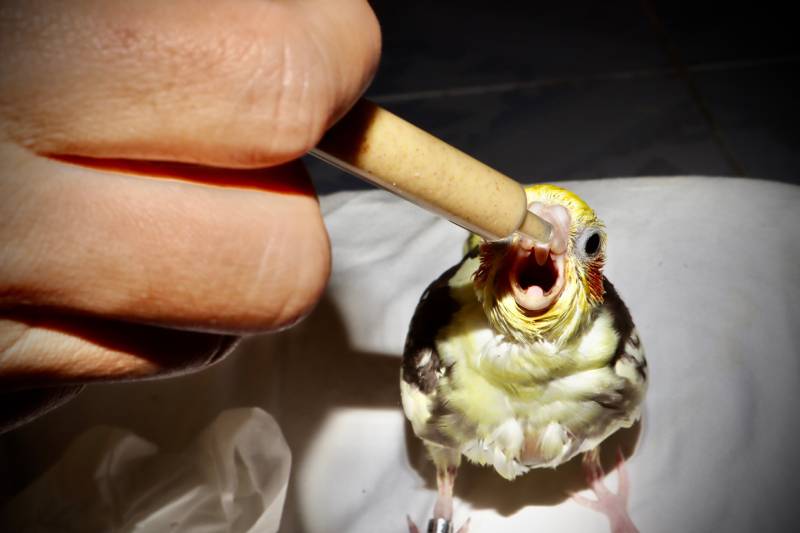
Foods To Avoid Giving Cockatiels
As you’ve seen, cockatiels can safely eat various healthy human foods in addition to their pellets and seeds. However, some foods are neither safe nor healthy for cockatiels and should be avoided. Any human foods that are processed, high in fat and salt, or greasy should not be fed to cockatiels. These include snacks such as potato chips, pretzels, crackers, and white bread.
Chocolate, foods with caffeine, and alcohol are all toxic to cockatiels and should be avoided. Some fruits and vegetables are not safe for cockatiels to eat. These include the following:
- Avocado
- Rhubarb
- Onions
- Garlic
- Raw Potato
- Cabbage
- Eggplant
If your cockatiel enjoys supervised outdoor playtime, don’t let them snack on a plant or tree without knowing if they are safe to eat. The same goes for houseplants you may have at home. If you are ever concerned that your cockatiel has eaten something unsafe, don’t hesitate to consult your veterinarian.
Feeding your cockatiels the wrong mixture of seeds can be dangerous to their health, so we recommend checking with an expert resource like The Ultimate Guide to Cockatiels, available on Amazon.
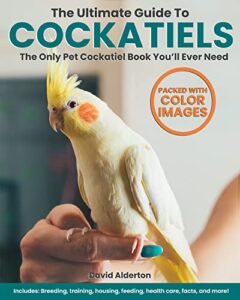
This excellent book will help you balance your cockatiels’ food sources by understanding the value of different seed types, dietary supplements, fruits and vegetables, and cuttlebone. You’ll also find tips on everything from housing to health care!
My Cockatiel Only Eats Seeds…Help!
As we discussed, cockatiels love seeds and, if given the choice, would probably pick them over most other foods. This is basically like a human eating only dessert for every meal. Yes, it’s delicious, but over time, it’s not nutritious!
If you were lucky enough to get your cockatiel started eating pellets at a young age, they will most likely go on happily eating them along with whatever else you offer. However, if you adopt an adult cockatiel, they might be a seed-eater only and turn up their beaks at your attempts to provide healthier food.
Since it will be healthier in the long run, it’s best to switch your cockatiel off a seed-only diet and onto the recommended pellet food. This should be done slowly, over about 4–8 weeks. Each day, offer a smaller amount of seeds to the cockatiel. Ensure they always have pellets and other healthy foods in separate dishes.
As they have less access to seeds, cockatiels should start eating more of their preferred foods. Your veterinarian can help you during this food transition to ensure it goes as smoothly as possible.

Final Thoughts
Healthy cockatiels can and should eat a variety of foods, much like they would in the wild. As we discussed, many healthy human foods are also safe for your cockatiel to eat. If you ever wonder whether certain foods are safe for your cockatiel, consult your veterinarian. Veterinarians are also your best resource to ensure your cockatiel’s nutritional needs are met correctly. Remember that variety is the spice of life, and while you should generally avoid spices, a varied diet will keep them fit and happy for many years.
You may also want to read:
- Can Parakeets Eat Cockatiel Food? What You Need to Know!
- Turtle Basking Explained: What It Is & Why It’s Necessary
Featured Image Credit: M. H., Pixabay
